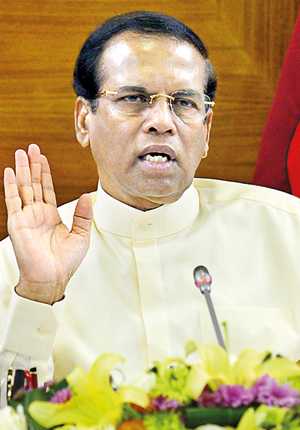Sunday Feb 22, 2026
Sunday Feb 22, 2026
Monday, 26 November 2018 00:57 - - {{hitsCtrl.values.hits}}
President Maithripala Sirisena yesterday indicated a softening of his stance, saying that he would be willing to accept results of the vote scheduled in Parliament on 29 November but was firm that he would not reappoint MP Ranil Wickremesinghe as Prime Minister.
 |
President Maithripala Sirisena gestures while addressing the Foreign Correspondents’ Association (FCA) yesterday – AFP |
“I will never appoint Ranil Wickremesinghe as the Prime Minister again in my lifetime,” Sirisena said at a meeting with the Sri Lanka Foreign Correspondents’ Association (FCA).
“If the UNP shows a majority in Parliament [on Thursday] under the methods I have outlined, then I will accept it … I have very clearly told them [UNP] not to recommend Ranil Wickremesinghe to be appointed as the Prime Minister,” Sirisena said when asked if he would be willing to reinstate the ousted Premier if his supporters were able to show a majority.
Sirisena drew examples from the parliamentary traditions of the United Kingdom to justify his stance saying that the convention was always to appoint an individual he took a liking to.
“It must be someone I like and must be someone who is compatible with me,” he insisted.
“Someone other than Ranil Wickremesinghe or Sarath Fonseka from the UNF has to be nominated, after the no confidence motion is properly passed in Parliament,” the President said.
President Sirisena insisted that the vote should only be taken by name or electronically, not by voice, although Standing Orders provide for it. Appreciating the proceedings of the House last Friday, Sirisena noted that parliamentary sessions had become calmer following the violence and unruly behaviour displayed in mid-November, which he condemned.
However, the President refused to acknowledge the current political turmoil as a serious concern, insisting the situation in the country was “only limited to Parliament business”.
Laying down the conditions he had outlined to accept the no confidence motion, he said the omission of the first clause of the motion passed on 14 November, which states that that the two gazettes issued by the President on 26 October, removing the sitting Prime Minister and appointing a new one, were unconstitutional and null and void, was a must. Sirisena expressed fears that the results of such a motion that included the clause may incriminate him as carrying out unconstitutional acts, which may later be used against him.
“If I accept that I have breached the Constitution, then it can be used to impeach me in the future,” he said.
Sirisena maintained that all his actions - the removal of the sitting Prime Minister, the new appointment, the prorogation of Parliament and its subsequent dissolution - were constitutional.
“My lawyers advised me that I am able to dissolve Parliament. There are three clauses on Parliament’s dissolution and only one says it could be done only after 4.5 years.”
However, when asked if he sought the opinion of the Supreme Court, he said he did not as his legal experts were of the opinion that it was within his power to dissolve Parliament as he did.
A disgruntled Sirisena claimed that the conflict between him and his onetime ally Ranil Wickremesinghe began just days into the partnership in January 2015, fresh after they were sworn in as President and Prime Minister. Justifying his actions to remove Wickremesinghe from his post as Premier, Sirisena vowed to appoint a separate commission to inquire into large-scale fraud and corruption, which were “rampant” in the Wickremesinghe Cabinet.
“I plan to appoint a separate commission to investigate the fraud and corruption that happened in this Government from the time it was set up till 25 October. The issues are that serious that the Central Bank fraud will pale in comparison to the other frauds that happened,” he claimed, adding that he was ready to reveal cases with evidence in time.
Laying the blame of stalled investigations on Rajapaksa era cases squarely on Ranil Wickremesinghe and onetime Law and Order Minister Sagala Ratnayake, Sirisena said that he did not interfere with ministries under UNP ministers, honouring the agreement of the Coalition Government.
“Ranil Wickremesinghe and Sagala Ratnayake should be the ones to answer for the delays in the investigations,” he claimed.
“The courts, Police, CID and Attorney General’s Department were all under their portfolios, they should be held responsible for the delays in the investigations,” he said, insisting that the investigations would go on without any interference.
However, Sirisena said that the investigations on corruption allegations against members of the previous administration would continue despite the majority of them being in the Cabinet he had formed with Rajapaksa whose family too had a number of pending court cases.
When asked why those battling corruption allegations had been reappointed by his administration, Sirisena claimed that when a government was formed in a hung Parliament it was difficult to avoid such politicians.
“Where can you find a politician without a corruption case? When you take allegations we can point at all parties. The problem is that Parliament lacks a clear majority,” he said, adding that he objected to the appointment of both Kapila Chandrasena and Nalaka Godahewa to two key State-owned enterprises. The moves have now been reversed, he said.
He added that he chose to appoint those facing corruption charges because there was a need to move forward.
“If you dwell in the past, political alliances will be impossible. The past is behind us. This is a fresh start, a new program.”